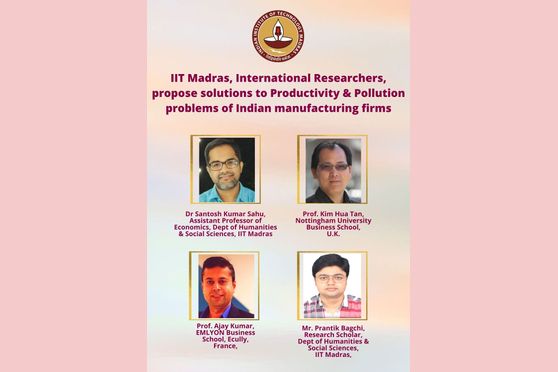IIT Madras research team proposes productivity and pollution solutions to manufacturers


The Indian Institute of Technology (IIT) Madras, along with international researchers, conducted a collaborative study to offer solutions to the problems of productivity and pollution in manufacturing firms. The researchers conducted an econometric analysis of data between 2001 and 2015 from the ‘Prowess IQ’ database of the Centre for Monitoring the Indian Economy.
The IIT Madras team was led by Santosh Kumar Sahu, assistant professor of Economics, department of Humanities and Social Sciences, IIT Madras; and included Prantik Bagchi, research scholar, department of Humanities and Social Sciences, IIT Madras. The international researchers included Ajay Kumar from EMLYON Business School, Ecully, France; and Kim Hua Tan from Nottingham University Business School, United Kingdom. Their findings were published in the peer-reviewed journal Annals of Operations Research.
The study led to the suggestion of a green domestic policy mapped with foreign direct investment (FDI) and trade to increase productivity and energy efficiency of the sector. It revealed the use of renewable energy in manufacturing can be promoted through one-to-one correspondence and linkages between tax and energy intensity. Tax credit or tax exemption as rewards should be given to firms that are improving energy efficiency. The sector is in dire need to adopt new technology that replaces vintage capital.
There are major policy implications of global climate change regulations that the study highlighted. In several countries, including the United States and China, an increasing number of cap-and-trade emission trading systems are also being implemented.
Slack environmental policies attract pollution-intensive industries and firms, thus ‘Performance, Achievement and Trade’ policies need to focus on these companies. To help these firms gain legitimacy and maintain their business, they need to be aided in improving their energy efficiency and reducing their pollution instead of being forced to relocate to pollution havens.
The study also concluded that spillovers from export participation and foreign direct investments can assist the Indian economy and increase the energy efficiency of the sector. Thus, for the green and sustainable development of the economy, sustainable energy policies targeting the manufacturing sector are imperative.
Speaking about the findings of the study, Sahu said: “Economic profit maximisation is one of the main objectives of any industry or firm. But with global climate change, does a firm look towards reducing carbon emissions and pollution at the cost of lower productivity? Is it right to levy more taxes on firms to reduce greenhouse emission? Does one target economic development or become more eco-friendly? These are questions we set out to find answers to.”
“In this research, we focused on linking existing energy policies with productivity and energy intensity. This research can be used as the basis for redesigning future PAT schemes and energy policies for pollution-intensive firms to achieve energy efficiency. We are also now working on estimating carbon productivity for the firms in India's manufacturing sector to link innovation, R&D, energy efficiency and carbon productivity. These results will be beneficial for better energy and climate policy for India,” Sahu said.
In the study, energy intensity and energy efficiency were the two factors taken into consideration. Analysis of the data between 2001 and 2015 concluded that energy efficiency has increased as there has been a decreasing trend for energy intensity. This further indicates technological advancement at the firm level in the manufacturing sector. Evidence suggests that price instruments and technology play a key role in reducing energy intensity.
The team believes that India’s energy consumption and emission structure could benefit from the study of recent data, including information on the stages of research and development, patents, and environmental expenses at the firm level for manufacturing industries.